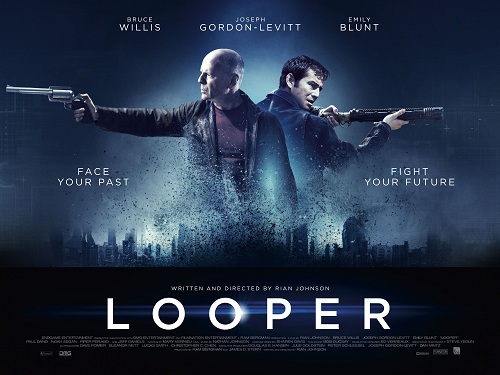Movie Review: Looper (2012)
The premise of Looper is easy to understand. Ready? Time travel is invented in the future. Time travel is immediately outlawed. The mob seizes control of time travel. The mob sends its hits to the past to be killed. (The future is a bad place for getting rid of bodies.) The people who kill for the mob are called Loopers. Loopers must one day kill their future selves and close the loop. (The mob doesn’t like loose ends.) Looper is the story of what happens if a loop is broken.
Simple, right? Well, maybe not, but don’t worry about it. Looper plays fast and loose with everything, eventually delivering a moving series of scenes exploring the complexity of human experience and choice. The science fiction here is a shiny veneer over a blood-drenched emotional core, but don’t let that stop you — it’s also a solid action flick, courtesy of Joseph Gordon-Levitt and Bruce Willis playing opposite ends of the same life amidst the mob scene.
Time travel can be difficult to execute well, and Looper is a strong example of the logical inconsistencies that can crop up when all the details aren’t painstakingly plotted out. In this film, if a future-self is existing in the same time as the present-self, damage dealt to the present-self body is immediately reflected on the future-self body. Letters scored into the present-self body? Appear as raised scars on the future-self body. Limbs removed from the present-self? Suddenly the future-self has stumps. However, the future-self’s actions aren’t altered by any of the sudden changes – it’s almost as if the future and the present are parallel time-streams and there’s no full causality connecting them. The past didn’t always happen that way. The amputation of present-self’s legs does not prevent future-self from driving across town.
That was needlessly complicated, wasn’t it? The movie’s attitude toward causality can really best be summed up by a line Future Joe throws at his younger self at a diner: “I don’t want to talk about time travel, because if we start talking about it then we’re going to be here all day talking about it, making diagrams with straws.”
The real crux of this film, its soul and backbone, are the choices we make. It’s about the people we are and the people we become. Would you kill an innocent if that person might one day commit a massacre? What would you sacrifice to save another – and would you only sacrifice for those you love, or also for those you barely know and have never met? What price is your future in the face of drug-fueled euphoria and paid-for pleasures to get you through today? The film is all these questions wrapped up in a fast-paced package of heart-pounding action, raw relationships, a believable futuristic society, and the surprisingly sidelined inclusion of telekinetic ability.
Looper is well worth a rental and a long conversation with some friends at a diner, complete with philosophical arguments and diagrams made of straws. (Probably the salt and pepper shakers, condiment bottles, and napkin holder too. Don’t be afraid to borrow from the other tables.)

